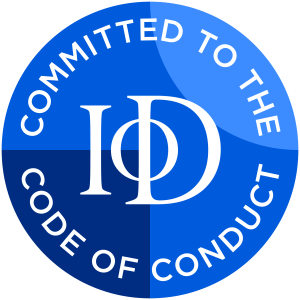In an age where the spotlight on corporate governance shines brighter than ever, boardroom dynamics are a critical determinant of organisational success. Directors, as stewards of their businesses, are increasingly under pressure to demonstrate accountability, transparency, and ethical leadership. But here’s a question for you:
Does your boardroom operate with a clear code of conduct?
And how does it measure up to the recently released Institute of Directors (IoD) Code of Conduct for Directors?
Let’s dive into why having a code of conduct matters and explore the IoD’s principles to see how they might shape—or even redefine—the expectations in your boardroom.
Why Does a Code of Conduct Matter?
A code of conduct sets the tone for how directors interact with each other, their teams, and external stakeholders. It’s more than just a set of rules; it’s a declaration of the values and behaviours your organisation expects from its leaders.
Without a structured framework, decision-making can become inconsistent, driven by individual agendas, or misaligned with the organisation’s goals. A code of conduct ensures clarity and builds trust, both within the boardroom and with stakeholders, including employees, investors, and the public.
In essence, it’s a blueprint for leadership integrity—a necessity in today’s fast-paced and complex business world. So, if your boardroom doesn’t have one, it’s worth considering whether it’s time to draft one. But if you do, how does it stack up against the IoD’s new voluntary Code of Conduct for Directors?
The IoD Code of Conduct for Directors: A Game Changer?

The IoD’s Code, unveiled in October 2024, provides a robust framework for directors to uphold ethical and responsible practices. Rooted in six key principles, the Code aims to guide directors in making informed and values-driven decisions. Let’s unpack these principles:
1. Leading by Example
Directors are expected to set a gold standard for personal and professional conduct. In practical terms, this means acting as a role model—an anchor of integrity that others in the organisation look up to. Ask yourself: does your board demonstrate exemplary behaviour that inspires the broader team?
2. Integrity
Ethical decision-making is at the core of the IoD Code. Directors are called to act honestly, comply with laws, and prioritise the organisation’s well-being over personal gain. Are your boardroom discussions consistently aligned with these principles?
3. Transparency
The IoD Code underscores the importance of open and honest communication. Directors are encouraged to provide clear and timely information to stakeholders, fostering a culture of fairness and openness. Reflect on your boardroom: are you truly transparent in your dealings, or are there areas where clarity could improve?
4. Accountability
Accountability is about owning decisions and their consequences. Directors are urged to give honest accounts of their actions and accept constructive feedback. This principle can sometimes be challenging—does your board embrace accountability, or is it an area for growth?
5. Fairness
Impartiality and inclusion are hallmarks of a fair boardroom. The IoD Code promotes decisions based on merit and equitable treatment of all individuals. How does your boardroom handle difficult decisions, and do you actively foster a culture of inclusivity?
6. Responsible Business
In today’s world, directors must think beyond short-term gains and consider the wider societal and environmental impacts of their decisions. The IoD Code encourages sustainable practices and long-term thinking. Does your boardroom weigh these factors consistently?
What’s Your Verdict on the IoD Code?
The IoD’s Code is voluntary, not a regulatory requirement. Its purpose is to offer directors a practical framework to navigate complex situations while maintaining high ethical standards. It’s not about adding red tape but providing a reflective tool for directors to ensure their behaviour aligns with the organisation’s goals and broader societal expectations.
Do you see this as a helpful guide for fostering stronger governance in your boardroom, or do you feel it’s just another document gathering dust on the shelf?
Implementing a Code of Conduct in Your Boardroom
If you don’t already have a code of conduct, the IoD’s principles could serve as a strong foundation. Here’s a step-by-step approach to implementing one:
– Engage the Board: Discuss the need for a code of conduct and gather input from all members.
– Define Core Values: Identify the principles that align with your organisation’s mission and vision.
– Draft the Code: Use clear, concise language to outline expectations for behaviour, decision-making, and accountability.
– Seek Feedback: Review the draft with stakeholders for insights and suggestions.
– Adopt and Communicate: Once finalised, ensure all directors understand and commit to the code.
– Review Periodically: Update the code as your organisation evolves or as external expectations shift.
– Talk to Carl about how he can help you integrate your code of conduct into your boardroom, book a discover call today.
Moving Forward: What’s Next for Your Board?
The IoD Code of Conduct for Directors is a timely reminder that governance is about more than ticking boxes; it’s about fostering a culture of trust, fairness, and responsibility. Whether you choose to adopt the IoD’s principles or develop your own, having a clear code of conduct can be transformative for your boardroom.
So, over to you. Does your boardroom have a code of conduct? If not, is now the time to create one? And if you do, how does it compare to the IoD’s framework? Let’s start the conversation and build better boardrooms, one principle at a time.

